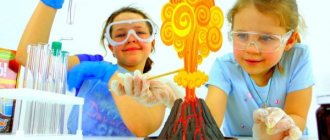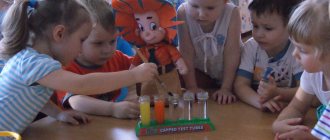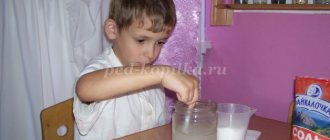Development of research abilities of older preschoolers in the aspect of the child’s personal development
,
MBDOU kindergarten teacher
general developmental type p. Verkh-Usugli
Tungokochensky district of the Trans-Baikal Territory,
highest qualification category.
Development of research abilities of older preschoolers
in the aspect of the child’s personal development.
“Every research is based on comparison
and uses the comparison tool"
Nikolai (Kuzansky) Krebs
The changes taking place in the modern world require updating of pedagogical technologies aimed at personal development. The draft standard for preschool education, developed on the basis of the Law on Education of the Russian Federation, defining the mandatory minimum content of the program implemented in a preschool educational institution, puts forward a number of requirements for the social and personal development of its pupils. These requirements also include the formation of research activities, which enable the child to independently find a solution or refutation of his own ideas, activate independent activity, avoid the development of intellectual passivity in preschoolers, and develop productive forms of thinking in them. The more diverse and intense it is, the more new information the child receives, the faster and more fully he develops. Research activities are quite easily integrated into many types of children's activities: play, project, productive,
Universal research abilities, among which the most significant are the ability to quickly navigate a situation, take a creative approach to solving problems, and the ability to find and analyze information, allow the child to actively act, transform and create. The foundations of their development are laid already in preschool age, which is characterized by special sensitivity to the assimilation of the surrounding reality and the activity of the preschooler - examination, cognitive, research. Children participate in research work with great interest, showing curiosity and a desire to experiment. Research activities allow you to organize learning so that the child can ask questions and independently find answers to them. By gaining experience in using inquiry processes, children practice constructing conceptual ideas about and interacting with the world around them.
It has been proven that research activity contributes to the development of thinking (, ,), activation of cognitive and creative activity (Dybina O. V., , etc.), the development of independence, initiative, self-control and activity of the individual in activities in general (, ,).
However, all these studies do not reflect a holistic approach to the development of research activities in the aspect of the personal development of a preschool child. This indicates, on the one hand, the relevance of the problem of developing research activity in older preschoolers, and on the other hand, its insufficient development in terms of the development of the child’s personality.
The psychological characteristics of the development of the research abilities of a preschool child are determined by the specific development of motivational, intellectual, creative and behavioral characteristics: in the structure of motivation for the research activity of a preschooler, the motives of “disinterested curiosity” and a tendency to experiment dominate, other motives (broad social, procedural) are in a subordinate position; visual-effective and visual-figurative thinking dominate over the relatively weakly represented verbal-logical thinking, which determines the nature of the child’s research search, that is, he can reason logically correctly, draw conclusions and conclusions when solving understandable, interesting research problems for him and at the same time observes facts accessible to his understanding, but on the other hand, the research activity of a preschooler is situational, and, consequently, the development of research abilities unfolds and stops rapidly. The search activity of children is fundamentally different from any other in that the image of the goal that defines this activity is itself not yet ready and is characterized by uncertainty and instability. During the search, it is clarified and clarified. This puts a special stamp on all the actions included in the search activity - they are extremely flexible, mobile and have a testing character.
To form this process, a teacher working with preschool children needs to create special conditions for the development of creative research activity.
Creating conditions for children's research activities in the context of personality-oriented education is presented as setting a specific program of action for the child to find ways to achieve goals. In this case, the formulation of the problem can be set by the teacher, and its solutions can be proposed by the child and include forecasts, assessments and a sequence of actions. Cognitive activity, taking on an experimental-search character, involves the creation of certain algorithms that serve as guidelines for children to correct their own activities.
Work on developing research activities among older preschoolers should be carried out gradually and in stages: Stage 1 -
direct development of research skills and abilities.
The content of the first stage includes tasks aimed at developing memory, attention and other cognitive functions. Stage 2 –
familiarization of preschoolers with educational research methods.
At this stage, a classification is proposed, with the help of which the process of educational research can be systematized. Stage 3 –
children conduct independent research, when the whole group is involved in the research search, the children themselves determine the goals and methods of achieving them.
In the course of research activities, a preschooler gets the opportunity to satisfy his inherent curiosity, to feel like a scientist, researcher, and discoverer. At the same time, the adult is not a teacher-mentor, but an equal partner, an accomplice in the activity.
Research activities develop children's cognitive abilities, as there is a constant need to perform operations of analysis and synthesis, comparison and classification, generalization, and the ability to make inferences and conclusions.
In our preschool educational institution, children's research projects, research work, modeling of problem situations, organizing mini-museums in a group, and developing research activities have been practiced for 3 years.
While conducting research, we adhered to the organizational structure proposed by and.
- non-standard use of class time and premises;
- reliance on the child’s experience;
— focusing the child’s attention on observations and experimentation;
- active participation of each child in planning their own research work;
— alternating individual and collective work, using elements of mutual learning.
As a result, children developed the skills and abilities to conduct research, and at the same time, this activity contributed to a more effective assimilation of ideas about the world around them.
Another mandatory condition for the development and self-development of a child is the creation of a spatial-subject environment in a preschool institution. Such an environment should be built on the principles developed by. The spatial-subject environment should facilitate independent acquisition of experience and finding new ways to implement activities. The developmental space of the group is a single chain of mini-environments where the development of the experimental abilities of a preschool child takes place. We create conditions so that in the process of research activities the child systematically independently either integrates methods known to him, or designs new methods, or builds a new type of business partnership with peers.
When determining the indicators of the development of skills and abilities in research activities, we used the works. Because he more specifically defined research skills and fully described the blocks that characterize research thinking. We developed criteria and levels of development of research activities. At the identified levels, it is possible to monitor the development of research activities.
The set of exercises and tasks we have developed is successfully used by educators in practice. This allows our kindergarten students to repeatedly win and take prizes in the traditional annual municipal competition of research and creative projects “ I am a researcher”
».
Properly organized research activities make it possible to satisfy children’s need for new knowledge and impressions, and contribute to the upbringing of an inquisitive, independent, successful child. The proposed system of work contributes not only to the intellectual development of the child, but also to increasing the level of professional competence of educators.
Bibliography:
1. Alyabyeva, -developmental activities for children of senior preschool age: method, manual for preschool institutions /. M: Sfera, 2002. – P. 96.
2. I. Babich, N. Development of questions in preschoolers / N. Babich // Questions of psychology. 1984. - No. 2. - P. 67-74.
3. Ganoshenko, N. I. On the development of cognitive needs in preschoolers / , BC Yurkevich // New research in psychology. 1983. - No. 1. - P. 47-62.
4. Godovikova, cognitive activity of preschoolers as a consequence of orientation-research activity in a new situation // New research in psychology. 1974. - No. 2. - P. 29-31.
5. Ermakova, flexibility of thinking in preschoolers // Questions of psychology. 1999. - No. 4. - P. 28-34.
6. Knyazeva, O. L. Features of the search activity of preschool children when solving visual-effective problems / O. L. Knyazeva // Questions of psychology. 1987. - No. 5. - P. 86-93
7. Kulikovskaya, experimentation. Senior preschool age: textbook. manual /, N. N Sovgir, - M.: Pedagogical Society of Russia, 2003. - P.80
8. Poddyakov, preschoolers in the process of experimenting with complex objects // Questions of psychology. 1996. - No. 4. - P. 14-23.
9. Poddyakova thinking and mental education of preschool children // , – M.: 1985. – P. 158
10. Savenkov, approach to the development of thinking of preschoolers // Preschool education. 1998. - No. 10.-S. 18-35.
11. Savenkov, researcher. How to teach a preschooler to acquire knowledge / . Yaroslavl: Academy of Development. - 2002.-S. 160.
12. Savenkov, towards giftedness: exploratory behavior of preschool children / . SPb.: Peter. - 2004. - P.272.
13. Savenkov, research in kindergarten: issues of theory and methodology // Preschool education. 2000. - No. 2. - P. 8-17.
14. What doesn’t happen in the world. Entertaining games for children from 3 to 6 years old: a book for kindergarten teachers and parents /' Ed. . M.: Education, 1991. – P.69.
15. Chumicheva, spatial-subject environment of child development // Kindergarten from A to Z. - 2005. - No. 4 (16). – p.7
Get text





